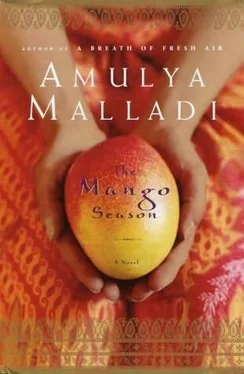a pinch of turmeric powder
1 teaspoon fenugreek seed powder
3 cups peanut oil
Mix the mango and dry ingredients and add three cups of peanut oil to the mixture. Let the pickle marinate for four weeks before serving with hot white rice and melted ghee (clarified butter).
It was overpowering, the smell of mangoes-some fresh, some old, some rotten. With a large empty coconut straw basket, I followed my mother as she stopped at every stall in the massive mango bazaar. They had to taste a certain way; they had to be sour and they had to be mangoes that would not turn sweet when ripened. The mangoes that went into making mango pickle were special mangoes. It was important to use your senses to pick the right batch. You tasted one mango and you relied upon that one mango to tell you what the other mangoes from the same tree tasted like.
“No, no.” My mother shook her head at the man sitting in a dirty white dhoti and kurta. His skin was leathery around his mouth and there were deep crevices around his eyes. His face spoke volumes about his life, the hardships, the endless days under the relentless sun selling his wares, sometimes mangoes, sometimes something else, whatever was in season. He was chewing betel leaves, which he spat out at regular intervals in the area between his stall and the one next to him.
“Amma,” the man said with finality, as he licked his cracked lips with a tongue reddened by betel leaves. “Ten rupees a k-g, enh, take it or leave it.”
My mother shrugged. “I can get them for seven a kilo in Abids.”
The man smiled crookedly. “This is Monda Market, Amma. The price here is the lowest. And all these, enh”-he spread his hand over the coconut straw baskets that held hundreds of mangoes-“taste the same.”
That had to be a stretch, but I didn’t say anything, didn’t want to get embroiled in this particular discussion. I stood mute next to my mother, patiently waiting for the ordeal to be over. My light pink salwar kameez was dirty and I was sweating as if I had never been through an Indian summer before. But I had been through twenty Indian summers, and now seven years later, I was having trouble acclimating to my homeland.
I pushed damp sweaty hair off my forehead and tried to tuck it inside my short ponytail. I had cut my hair a few years ago and stuck to the shoulder length hairdo. My mother had been appalled when I sent her pictures and had bemoaned the loss of my waist-length black hair.
“You go to America and you want to look like those Christian girls. Why, what is wrong with our way? Doesn’t a girl look nice with long, oiled hair with flowers in it? Even when you were here, you didn’t want the nice mallipulu, fresh jasmine, I would string. Always wanted to look like those… Short hair and nonsense,” she complained on the phone before thrusting it in my father’s hands.
I would have preferred to wear a pair of shorts to ward off the tremendous heat but Ma instantly rebelled at the idea. “Wearing shorts in Monda Market? Are you trying to be an exhibitionist? We don’t do that here.”
Since I had arrived three days ago I had heard that many times. “We don’t do that here.” As if I didn’t know what we did or did not do. I was “we.”
My mother picked up a mango and asked the mango seller to cut a slice. She handed the slice to me. “Here, taste,” she instructed, and I looked, horrified, at the slimy piece of raw fruit thrust under my nose.
Was she out of her mind? Did she expect me to eat that?
“Here,” she prodded again, and shoved it closer to my mouth and the strong smell of mango and its juices sank in. And memories associated with that distinct smell trickled in like a slow stream flowing over gently weathered stone.
I remembered stealing mangoes from the neighbor’s tree and biting into them with the relish of a theft well done. I remembered sneaking into the kitchen at night to eat the mangoes Ma was saving for something or other. I remembered sitting with Nate and eating raw mangoes with salt and chili powder, our lips burning and our tongues smacking because of the tartness. Now, I couldn’t imagine putting that piece of white and green fruit inside my mouth. It was not about taste, it was about hygiene, and suddenly everything everybody had warned me about India came true.
My Indian friends who visited India after living in the United States said: “Everything will look dirtier than it did before.” I never thought myself to be so Americanized that I would cringe from eating a piece of mango that had languished in that man’s basket where he had touched it with his hands and…
I shook my head when the man scratched his hair and used the same hand to find a piece of food between yellow teeth, while he waited for judgment to be passed on his mangoes.
Ma sighed elaborately and popped the piece of mango into her mouth. From her eyes I could see she was excited. From the myriad mangoes she had tasted all morning, this was the one that would be perfect for her pickle. But she was not going to let the mango seller know it. It was Haggling 101.
“They are okay,” she said with a total lack of enthusiasm.
“Okay, enh?” The man frowned and slapped his thigh with his hand in disapproval. “Amma, these are the best pachadi mangoes in all of Monda Market. And”-he paused and smiled at me-“I will give them to you for nine rupees a kilo, enh?”
Ma waved a hand negligently, and memories of my mother bartering over everything came rushing back like a tidal wave. The worst of all incidents was when we were on vacation in Kullu Manali in Himachal Pradesh. It was a popular vacation spot in the Himalayas before Kashmir had become such an issue with Pakistan. In a bazaar in Manali, Ma was trying to buy a shawl; it was not just any shawl, this was an in-fashion and in-high-demand woolen shawl, which had different colors on each side. This was a blue and black shawl and Ma was haggling like she had never haggled before.
The bargaining had stopped over one single rupee. The man said fifty and Ma said forty-nine and they went on for ten minutes after which Ma just walked out of the store. I was about thirteen years old and unhappy that we had just spent half an hour haggling over something she was not going to buy. I didn’t know that she was using another haggling tactic of walking out of the store and then being called in by the vendor who would then believe that she was serious about one rupee.
As I was dragged by the hand out of the shawl shop I cried out, “It is just one rupee, Ma, why do you have to be such a kanjoos?”
As soon as the word was out, I knew it was a mistake. Ma slapped me across the face in the center of the market and took me weeping and wailing back to our hotel.
She never forgave me for letting the entire marketplace know that she was haggling over one rupee or for the loss of the blue and black in-fashion and in-high-demand shawl. The vacation went to hell after that as Ma kept telling me how she was not a kanjoos, not a scrooge, and she was only trying to save money for our future, Nate’s and mine. When I reminded her that she was buying the shawl for herself, I was awarded another sound slap. I sulked for the rest of the vacation and for a couple of weeks even after we got back home to Hyderabad.
Thanks to happy memories like that I never, ever, bargained. It was a relief that in the United States I didn’t have to do it for groceries and clothes; everything came with a fixed price tag. And even when I went and bought my car, I didn’t barter or bargain. The nice Volkswagen dealer gave me the price; I agreed and signed on the dotted line even as Nick insisted that I was being conned.
“You could get it for two thousand dollars less, at least,” he told me when I was signing the loan papers.
Читать дальше











